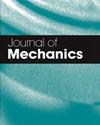Realization and optimization of a binary cycle power generating system using a low-grade heat source
IF 1.8
4区 工程技术
Q3 MECHANICS
引用次数: 0
Abstract
Abstract The low-grade heat source thermoelectric system generates electricity using a working fluid at temperature lower than 100°C or gas at temperature lower than 250°C. The system is usually composed of binary (1 + 0.5 × 2) cycles. Positive net output power or high efficiency of the system can only be feasible after optimization. Most works focused on the cycle of working fluid and treated the power consumptions of the other cycles as constants. However, both cycles should be comprehensively considered in optimization, especially when power consumptions vary with working conditions. This research selected an organic Rankine cycle thermoelectric system for demonstration. A thermodynamic model conforming to the target system was built. The temperature of the heat source and the pressure at expander inlet were tailored using the genetic algorithm. The best efficiency is 1.89%, and the largest net output power is 5.80 kW. Both results are better than those (efficiency = 1.59% and net output power = 5.34 kW) from benchmarks under the highest temperature of heat source and inlet pressure among possible working conditions. Experimental results are provided for both validation of the model and confirmation of the superiority of optimization results.低品位热源双循环发电系统的实现与优化
低品位热源热电系统利用温度低于100℃的工质或温度低于250℃的气体发电。该系统通常由二进制(1 + 0.5 × 2)周期组成。系统的净输出功率为正或效率高,只有经过优化才能实现。大多数的工作集中在工作流体的循环,并把其他循环的功率消耗作为常数。但是,在优化时应综合考虑这两个周期,特别是在功耗随工况变化的情况下。本研究选择了一个有机朗肯循环热电系统进行演示。建立了符合目标系统的热力学模型。采用遗传算法对热源温度和膨胀机入口压力进行了优化。最佳效率为1.89%,最大净输出功率为5.80 kW。这两个结果都优于在最高热源温度和进口压力条件下的基准测试结果(效率= 1.59%,净输出功率= 5.34 kW)。实验结果既验证了模型的正确性,也证实了优化结果的优越性。
本文章由计算机程序翻译,如有差异,请以英文原文为准。
求助全文
约1分钟内获得全文
求助全文
来源期刊

Journal of Mechanics
物理-力学
CiteScore
3.20
自引率
11.80%
发文量
20
审稿时长
6 months
期刊介绍:
The objective of the Journal of Mechanics is to provide an international forum to foster exchange of ideas among mechanics communities in different parts of world. The Journal of Mechanics publishes original research in all fields of theoretical and applied mechanics. The Journal especially welcomes papers that are related to recent technological advances. The contributions, which may be analytical, experimental or numerical, should be of significance to the progress of mechanics. Papers which are merely illustrations of established principles and procedures will generally not be accepted. Reports that are of technical interest are published as short articles. Review articles are published only by invitation.
 求助内容:
求助内容: 应助结果提醒方式:
应助结果提醒方式:


